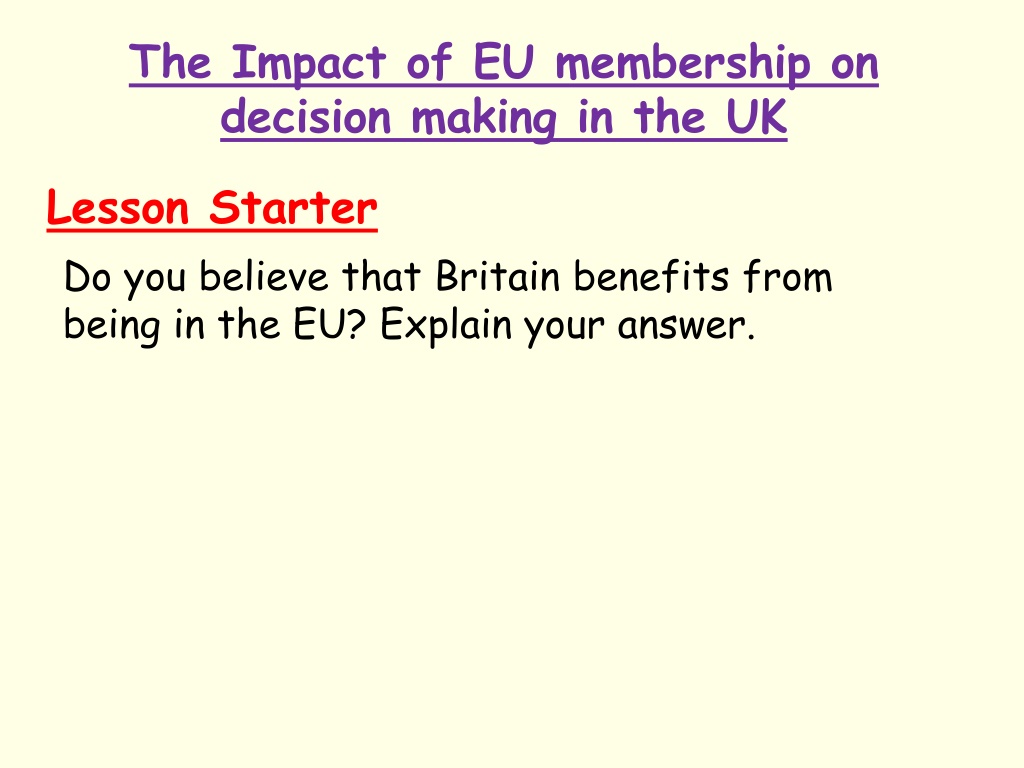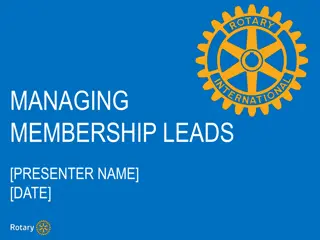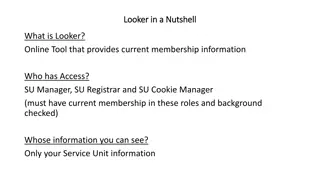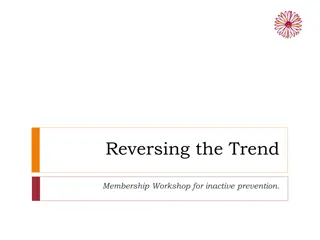Understanding the Impact of EU Membership on Decision Making in the UK
Exploring the implications of EU membership on the UK's decision-making processes, this lesson starter prompts students to consider the benefits and limitations associated with being part of the EU. It covers topics such as EU laws implemented in the UK, the influence of the EU on Scottish and UK parliaments, the structure of the European Parliament, and examples of EU decisions affecting everyday life in the UK.
Download Presentation

Please find below an Image/Link to download the presentation.
The content on the website is provided AS IS for your information and personal use only. It may not be sold, licensed, or shared on other websites without obtaining consent from the author. Download presentation by click this link. If you encounter any issues during the download, it is possible that the publisher has removed the file from their server.
E N D
Presentation Transcript
The Impact of EU membership on decision making in the UK Lesson Starter Do you believe that Britain benefits from being in the EU? Explain your answer.
Today we will Identify the EU laws that have been implemented in the UK. Identify how the powers of the Scottish and UK parliaments are limited by the EU.
Success Criteria I can list and explain the different EU laws. I can work cooperatively to show the impact of EU decision in the UK.
The European Union, or EU, describes itself as a family of democratic European countries, committed to working together for peace and prosperity.
The Impact of EU membership on decision making in the UK 28 member states European Parliament has 766 seats from 28 member countries. The European Parliament is composed of publicly elected members (MEPs) from each member state. Elections are held every five years. The European Parliament is divided into political rather than national groupings, for example, the Socialist Group, the Christian Democratic Group and the Green Group. MEPs choose which group they wish to belong to.
The Impact of EU membership on decision making in the UK There are 73 UK MEPs The UK is split into 12 REGIONS for EP elections and each region has 3-10 MEPs depending on population Scotland has 6 2 SNP, 2 Labour, 1 Conservative and 1 UKIP see next slide
EU Decision Making In certain areas such as tax, defence, health, industry, culture, tourism, education, youth, sport and vocational training - the EU has the right to support, coordinate or supplement the actions of member states like the UK. Euro MPs don't set our taxes or decide if a local school or hospital is going to close, but they do have a big influence on how we live our lives. They make decisions in Brussels that directly affect our jobs, our family lives, the health care we get, rules about recycling and energy. MEPs passed a law a few years ago significantly cutting the cost of texting from abroad. Roaming rates were also cut. They also stopped airlines from using misleading adverts that suggest we can fly to Spain for 50p.
Impact of EU on Decision-Making in Scotland and the UK
The Scottish Parliament and the EU The following examples show how decisions made by the Scottish Parliament can be restricted by and influenced by the EU.
Negative Impact - Minimum Pricing of Alcohol Certain laws that have been passed in the UK and Scotland have been challenged by the EU. Minimum Unit Pricing on Alcohol Knowledge - The Scottish Government proposed this to tackle Scotland s unhealthy relationship with alcohol. They argue that affordability is one of the main reasons for the increase in consumption. It is estimated that alcohol is now 44% more affordable in the UK than it was in 1980. Tackling price could lead to reduced consumption and related harm. The Alcohol (Minimum Pricing) (Scotland) Act 2012 was passed in June 2012 and will pave the way for the introduction of a preferred minimum price of 50p per unit.
The EU and Minimum Unit Pricing Knowledge - Some member states of the EU are against Scotland s minimum pricing on alcohol and they are trying to block the plans. Analysis - France, Spain, Italy, Portugal and Bulgaria have said that the policy is illegal arguing that it breaches EU Free Trade Laws. The Scottish Whisky Association has also challenged the law. Free trade within EU states means that barriers to trade have been broken down with reduced taxes and tariffs.
What can the EU do about MUP? Analysis - The wine producing countries have argued that this policy will have a devastating impact on the wine and spirits industry. These countries have argued that it breaches the European Free Trade Law as it discriminates against imported products. Why are the producers against the policy?
What can the EU do about MUP? Analysis - Under European law, countries can restrict imports on public health grounds but only if it doesn t restrict trade between member countries. The issue that member countries have is: It would affect competition between countries as it would mean that cheaper products would be at a disadvantage. It would not allow the free movement of goods. It would not allow for healthy and fair competition between countries and countries would suffer from a loss in profit. Analysis - As a result of the these concerns, the Court of Justice of the European Union will decide if the policy is legal. They have said that member countries do have the right to protect citizens on grounds of health but the policy may disadvantage other members. They may advise on a different approach. For example increasing alcohol taxation. All of this shows that the EU has a significant impact on DECISION-MAKING in Scotland.
Negative Impact - Common Fisheries Policy Knowledge - This sets quotas about which member states are allowed to catch fish in particular areas and also about the amount of fish each state can catch. The whole purpose is to manage fish stock for the EU. Analysis - It has been criticised by some Scottish fishermen who say it is threatening their livelihoods. Knowledge - The fishing industry in Scotland comprises a significant proportion of the UK fishing industry. In some areas such as Peterhead the fishing industry creates 40% of employment.
Analysis TheCFP has been heavily criticised by fishermen in the UK and Scotland because: It is seen as wasteful as 75% of stocks were overfished . The quotas were not properly enforced by the EU. Also, when ships caught more fish than their quotas allowed, they had to throw extra dead fish (known as discards) back into the sea. The Scottish Government felt fishermen have very limited opportunity to influence EU fisheries policies because they do not have much contact with the EU decision makers. Some fisherman feel that the rules were written by bureaucrats who had no expertise in fisheries and fisherman were not consulted. Therefore, it could be argued that the EU should not manage the fisheries and it should be placed under national control. This would mean that the Scottish Parliament would legislate on it. This again shows how the EU is making decisions for Scotland which underlines its influence.
Positive Impact - Common Fisheries Policy Knowledge Because fish don t follow frontiers, the European Union needs a common policy to manage fisheries. The CFE protects stocks and prevents damaging competition between fishing fleets. Analysis - Having the Spanish, French, British, Irish and Portuguese fleets all competing independently under national rules for declining stocks in the same Atlantic waters would lead to chaos and so the CFP has a positive impact in Scotland as it protects the long term future of the industry and prevents conflicts between different countries. Analysis - The whole idea of the CFP is to make Europe's fishing stable and sustainable and prevent conflicts arising where foreign trawlers fish in another country's waters. In 2013 the CFP was amended meaning that fishermen no longer need to throw discards back into the sea. In addition, it is hoped that all EU countries with fishing industries will see increased yields in future years. It could be argued then that the fact that the EU created the CFP means that decisions are taken collectively which is beneficial to Scotland either way the CFP has a huge impact on decision-making in Scotland.
The UK Parliament and the EU The following examples show how decisions made by the UK parliament can be restricted by and influenced by the EU.
Stand-off between EU and UK - Prisoner Voting Rights Knowledge - Prisoners in the UK do not get to vote in elections. However, some prisoners have argued that under EU law, they have the right to vote. The European Court of Human Rights (ECHR) have said that the UK s blanket ban on votes for convicted inmates is a breach of human rights.
Knowledge David Cameron, December 2013 Prisoners "damn well shouldn't" be given the right to vote The court's powers must be restricted, we need to clip its wings". Analysis - This issue is currently under investigation and the UK may be forced to reconsider its blanket ban on prisoners votes. A cross-party committee of MPs and peers has recommended prisoners serving jail terms of a year or less and those coming to the end of their sentences should be entitled to vote. This example clearly shows how the decision-making power of the UK government is restricted by the EU although it seems that the current UK government is unlikely to budge on this issue could put UK on collision course with EU.
Positive Impact Mobile Phone Roaming Charges Knowledge - The European Union is proposing to scrap mobile phone roaming charges across Europe. Measures will reduce consumer charges. Roaming charges for using a mobile phone abroad will be abolished from December 2015 Posting holiday snaps to Instagram or keeping up with emails while abroad should no longer result in unexpectedly high bills Analysis This has a major effect on decision- making in the UK as the EU are essentially writing legislation which applies to Britain and all other EU member countries.
Positive Impact Mobile Phone Roaming Charges Knowledge - But a coalition of networks representing 45 million consumers has warned that the legislation is so badly designed that the cost of domestic calls could rise to pay for it. There is a risk that calls for domestic UK calls will increase according to the roaming coalition. Roaming might not be subject to surcharges anymore, but the overall level of tariffs would increase, and non-roaming customers might effectively foot the bill for roaming customers. Analysis Therefore the EU s decision to scrap roaming charges might have a negative impact on the UK since there may be an overall rise in tariffs as a result and again this shows how the EU has a huge impact on decision-making in the UK.
Ability to Opt Out Working Time Directive Knowledge Part of the EU Working Time Directive limits the working week to 48 hours. Britain opted-out of this aspect of the directive which allows workers to say that they do not want their time to be limited. UK Government at the time believed that opting out gives more flexibility and boosts the economy by allowing people to decide how many hours they wish to work. Analysis Since it is clear that Britain can OPT-OUT of certain EU laws, it is clear that some EU policies do not have a direct impact on decision-making in the UK
Ability to Opt Out The Euro Knowledge Britain also opted out of the new European currency created in 1999 The Euro. The Euro is used by 19 of the 28 EU countries. These are known as the Eurozone countries. Analysis The fact that Britain was allowed to opt-out of the Euro without receiving sanctions shows that the EU s decision-making power in Britain is limited. Britain continues to use the pound sterling.
Ability to Opt Out Eurozone Bailout Knowledge - countries such as Spain, Ireland, Portugal and Greece have received money from the EU to bailout their failing economies. UK wants to ensure that they are not responsible if any of the countries fail to pay back the money. The Queen s speech highlighted the UK s intention to withdraw from EU bailouts. The countries affected are in hundreds of billions of euros of debt and the bailout essentially means that some EU countries like Germany are buying up the debt of the affected countries. Analysis The fact that the UK has opted-out and does not contribute to the bailout fund shows that in this case its decision-making power has not been affected by the EU.
Negative impact on decision-making? Freedom of Movement Knowledge Freedom of Movement means that all EU citizens are entitled to look for a job in anther EU country without needing a work permit and reside in the country. This means that UK citizens can live, work or study in any of the other 27 countries in the EU such as France and Germany. David Cameron has suggested that there should be limits to the freedom of movement of European countries since poorer countries like Romania and Bulgaria have joined. This is because of the supposed threat of benefit tourists who might travel to countries to take advantage of their superior welfare systems. Analysis However, Britain does not have the ability to opt-out of this aspect of EU membership. If Britain wants to remain in the EU it must accept the freedom of movement policy and this shows the huge impact that the EU has on decision-making in the UK when it comes to immigration. This has contributed to the rise of Nigel Farage s UKIP party who argue that the UK should leave the EU.
Positive impact on decision-making? Freedom of Movement Knowledge However, a report from University College London (UCL) in 2014 found that from 2004-2011 EU immigrants to Britain actually contributed almost 5 billion to the UK economy. These immigrants paid $5 billion more in taxes than they took out in services (like welfare, NHS etc.) EU immigrants from countries including Poland often take on jobs that UK citizens do not want and many other immigrants bring useful skills to the British work-force which benefits the UK economy. Analysis This shows that the EU has a massive impact on decision-making in the UK and in the case of freedom of movement it could be argued that this impact has been beneficial to the UK.
HOMEWORK Negative impact of EU UK contributes more than it gains Knowledge Analysis Research to find knowledge points about this. Then provide analysis. In other words, explain the impact the EU has on the UK s ability to make decisions about what it contributes to the EU.
Impact upon UK decision making Can the UK simply ignore EU legislation? No, but they can certainly challenge it. The UK can make an amendment by an Act of Parliament. Member states must also look out for developments in the domestic and European courts, which might mean some laws need to be adapted. What if member states defy EU law? The UK has to meet timescales for implementing EU law. Even before the measure is adopted, member states will have started thinking about a project plan for implementation, including key dates by which consultations must have been completed. Failure to implement laws within the Commission's deadline will give rise to possible actions against the government, before both national and European courts.
Impact upon UK decision making Can the UK simply ignore EU legislation? What if member states defy EU law? http://www.lawthink.co.uk/2011/10/european-court-vs- the-uk-the-consequences-of-ignoring-judgments/ http://news.bbc.co.uk/1/hi/world/europe/8160808.stm http://ukhumanrightsblog.com/2011/10/23/can-britain- ignore-europe-on-human-rights/
The European Union: Better off in or out? David Cameron is expected to promise to "make sure" UK voters get a referendum on whether to leave the European Union. He wants to have an in-out referendum by the end of 2017. William Hague: "Too often, the British people feel that Europe is something that happens to them, not something they have enough of a say over. That the EU is happy speaking but does not seem interested in listening He also argues that he has a record of "standing up" to Brussels over Eurozone bailouts and EU budgets. British people were concerned that they had little say about how the European Union affected their lives. Cameron s Speech on Europe
The Limitations of the EU International Issues. Member countries do not have to consult the EU when going to war. Each member state still has sovereign power which means that each country can make final decisions. These decisions made have implications to future involvement with the EU. Limitations of the EU Opt outs. Meaning that countries do not have to participate in these policy areas. The UK has opted out from the Euro and the Working Time Directive The Eurozone bailout. UK government refused to participate in this.
Homework Look into the impact of the EU on decision-making for the following The Environment emissions, home energy efficiency EU safety regulations impact on homes/businesses Political correctness what words/phrases are acceptable clash with UK laws? Opinions? Trade as a unit beneficial? Does the EU restrict the UK s ability to trade internationally?
Knowledge Question Evaluate the impact the EU has on decision making in the UK 12 marks
Planning your answer Possible paragraphs Minimum Pricing of Alcohol Common Fisheries Policy Opt outs e.g. 48 Hour Week Working Time Directive, the Euro Currency positive? Allows UK to pick and choose? Freedom of Movement Mobile Phone Roaming Charges positive cheaper phone calls? Or not. Voting Rights for Prisoners UK on collision course with EU? Try to get your opinion across
Was I successful? I can list and explain the different EU laws. I can work cooperatively to show the impact of EU decision in the UK.























